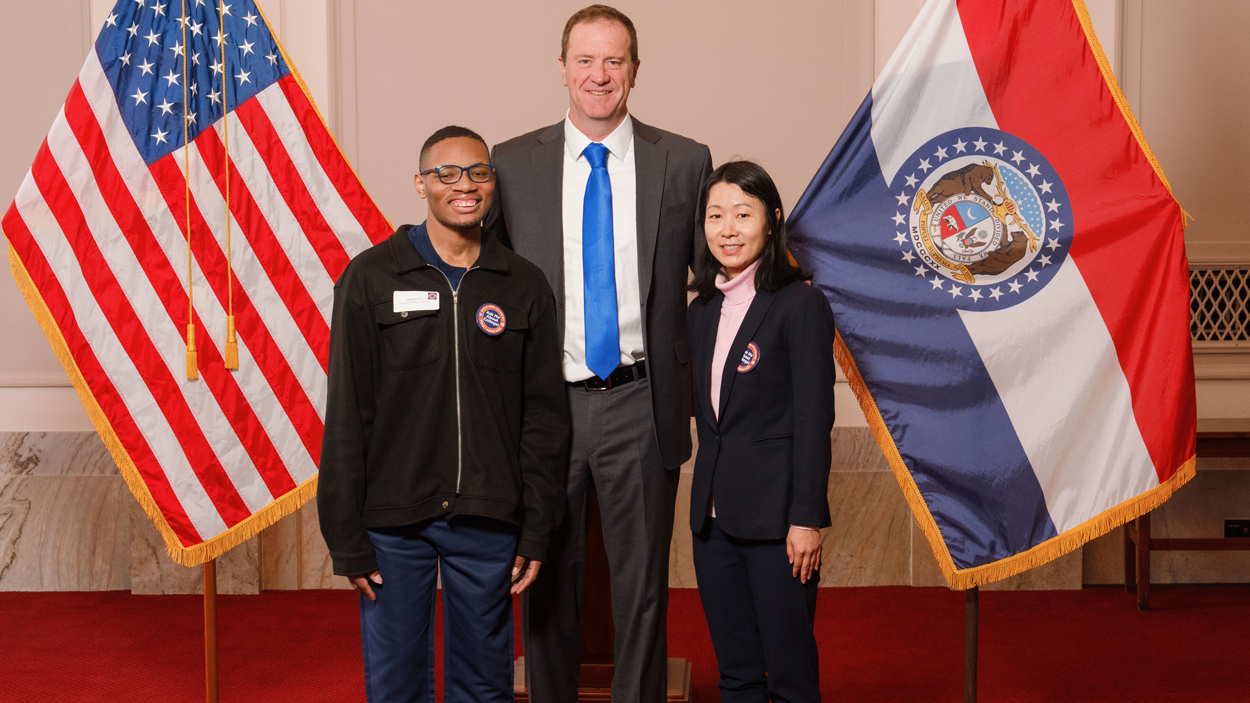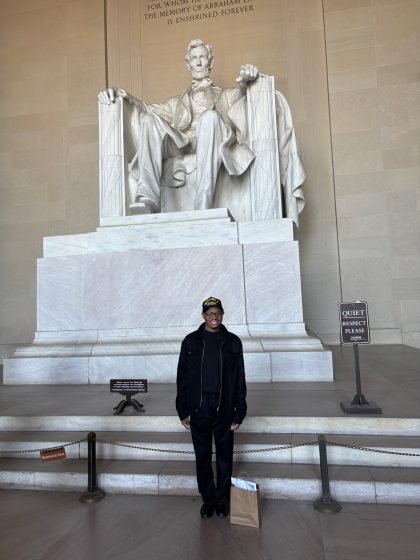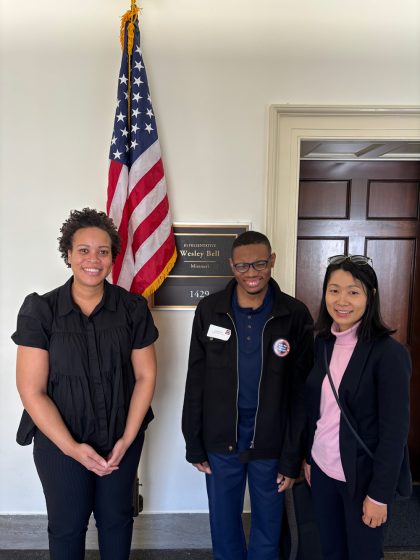
Succeed+ student Jaylin Brown (left) and Wen Zeng (right), senior program and project support coordinator for the Office of Inclusive Postsecondary Education, traveled to Washington, D.C., for three days in March to take part in policy training and speak with legislators and their staff on Capitol Hill, including Sen. Eric Schmitt (center). (Photos courtesy of Aina Ferris and Wen Zeng)
Jaylin Brown was thrilled as he strolled through the National Mall in Washington, D.C., taking in sights such as the Lincoln Memorial, the Washington Monument and the World War II Memorial.
The tour of monuments was just a pleasant detour, though. Brown, a Succeed+ student at the University of Missouri–St. Louis, was in the nation’s capital to participate in the time-honored American tradition of making his voice heard. He was speaking up for the disabled community.

Jaylin Brown also took time to take in the sights in Washington, D.C., including the Lincoln Memorial.
Brown and Wen Zeng, senior program and project support coordinator for the Office of Inclusive Postsecondary Education, traveled to the nation’s capital for three days in March to take part in advocacy and policy training on a variety of disability-related issues, with a focus on inclusive postsecondary education. The trip culminated with one-on-one meetings with Missouri legislators and their staff on Capitol Hill, including Sen. Eric Schmitt.
“It was an honor, and also I felt excited because I always wanted to go to D.C.,” Brown said.
However, the trip wasn’t Brown’s first brush with advocacy.
Brown graduated from McCluer High School in Florissant, Missouri, and became interested in attending UMSL because of the College of Education’s Office of Inclusive Postsecondary Education and the Succeed Program.
UMSL has been a trailblazer in postsecondary education for students with intellectual and developmental disabilities since the founding of the Succeed Program in 2013. Over the past decade, it has grown exponentially. Now, the OIPE oversees Succeed, Succeed+ and Link programs, which help students develop academic, living and vocational skills as they work toward a two-year Chancellor’s Certificate, credentials or a degree program of their choice.
“What I liked about it was they advocated for us, for disabled students, to have access to education and for us to be treated equally to people who are not disabled,” Brown said.
Brown has earned his Chancellor’s Certificate and transitioned to Succeed+ where he’s currently earning professional credentials. During his nearly three years at the university, he’s enjoyed immersing himself in the UMSL community, attending events like UMSL Social Peers parties and making friends across campus.
In his first year in the program, Succeed faculty and staff members recognized Brown’s eagerness to stand up for his peers and the disabled community.

Jaylin Brown and Wen Zeng met with Rep. Wesley Bell’s team, including his chief of staff, Whitley O’Neal.
“They noticed I may be a good advocate,” he said. “I went on a trip to Jefferson City and did good there. I started my advocacy career, where I’ve been to Jefferson City three times.”
His experience speaking with legislators at the Missouri State Capitol made him a natural candidate for the Think College Policy Advocates program. Since 2019, the Think College National Coordinating Center and the Association of University Centers on Disabilities have partnered on the initiative.
Each school year, the program selects a cohort of up to 10 teams comprised of a college student with an intellectual disability and a college staff member. The teams are then paired with a coach from AUCD and provided with training on disability advocacy. Brown and Zeng were selected for the 2025 class, and they begin monthly online trainings in September before the trip to Washington in March.
During the first two days of the trip, Brown and Zeng had in-person training sessions with the other teams and representatives from AUCD and Think College. They also had the opportunity to tour the White House. On the third day, Brown and Zeng met with Schmitt; Whitley O’Neal, chief of staff for Rep. Wesley Bell; and a staff member from Sen. Josh Hawley’s office.
“During our meetings with all those legislators, we focused our conversation on talking about Jaylin’s experience, my experience as staff and also provided information on our program outcomes,” Zeng said.
Brown said his primary goal going into the conversations was for disabled voices to be heard. He explained the benefits of the Succeed program and the importance of disability rights to the legislators and encouraged them to make inclusive postsecondary education a priority in Missouri.
Although Brown was a little nervous, he felt that the meetings went well and that the legislators were willing to listen to him.
“We accomplished most of our goals, but we have some left,” he said. “It was fun and also a big honor to be there.”
Brown’s advocacy work will continue this summer through a paid internship with the Institute for Human Development, an applied research and training center for human services at the University of Missouri–Kansas City. The institute is a designated University Center for Excellence in Developmental Disabilities and a member of AUCD.
Brown will return to UMSL next fall to work toward more professional credentials and hopes the internship might lead to a full-time position with the organization down the road. But no matter where Brown goes in the future, he is determined to make a career fighting for his community.
“Disabled people need to be treated equally, to be seen as people who can work or do anything non-disabled people can do,” he said. “That is why I do advocating, because I’m speaking for disabled people everywhere. That is why I enjoy advocating so much.”














